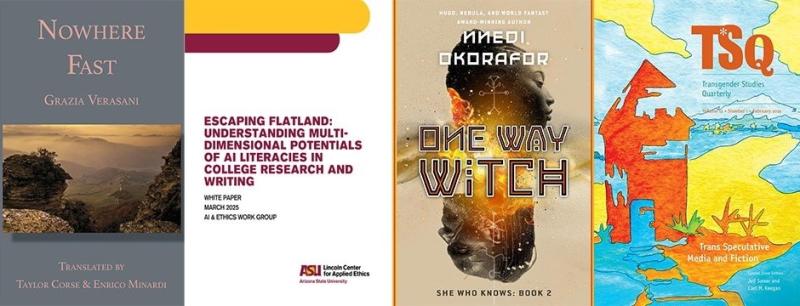By Kristen LaRue-Sandler — June 9, 2025

Four faculty members in the ASU Department of English announce volumes recently published. Works include a translation, a white paper, a novel, and a journal special issue. Genres and topics include Italian crime fiction, AI and ethics, Africanfuturism, and transgender studies.
‘Nowhere Fast’ by Grazia Verasani (Italica Press, 2025)
Originally published in 2006 as “Velocemente da nessuna parte,” this February release was translated from the Italian by Taylor Corse and Enrico Minardi. From the publisher:
“‘Nowhere Fast’ is the second book in the PI Giorgia Cantini series. Again in Bologna, Giorgia investigates the disappearance of Vanessa Liverani, a high-class call girl. There Giorgia uncovers a sordid world of prosperous businessmen, doctors, and lawyers who hire prostitutes for private sex parties. She loathes the predatory behavior of these apparently respectable men — men as empty and rotten as the contemporary society they represent.
Much of ‘Nowhere Fast’ takes place in the countryside of Emilia-Romagna, around the village of Sasso Marconi, among the sandstone cliffs of Contrafforte Pliocenico Natural Reserve. But even there, Giorgia fails to find an idyllic existence as she gets to know four generations of the Liverani family, whose troubled lives remain rooted in the older traditions and rhythms of rural life. Between these two worlds, Vanessa’s young son Willy is trapped. Though surrounded by family, he is tragically on his own.
Meanwhile, Giorgia herself struggles between memories of her unruly and joyous youth — where the discovery of sex played a big role — and the bitter realities of her adult life. In Giorgia’s view, growing up comes to be seen as a layer of ice slowly spreading over our ability to have strong feelings and authentic personal lives.”
Corse is a professor emeritus in the ASU Department of English’s literature program.
‘Escaping Flatland: Understanding Multi-Dimensional Potentials of AI Literacies in College Research and Writing’ (ASU Lincoln Center for Applied Ethics, 2025)
With others in the AI and Ethics work group, Sarah Florini co-authored this white paper announced in March. From the publisher:
- "The field of writing practices is not merely skills; it is expression, interpretation, negotiation, communication, reflexivity, and more. The more we conceptualize the development of large language models as a process resulting in new writing technologies rather than as a precursor to general artificial intelligence, the closer we get to thinking about AI literacy as a contact zone, and the further we get from Flatland conceptions of this technology. We propose teaching students that, as part of an ensemble of activities, AI literacy is a way to discern the ethics of knowledge rendered through a relationship with a technological interface. We encourage all those in the academe to consider: if these technologies are here to stay, how can we empower students to do something about their ethical commitments, given the power embedded in these interfaces."
Florini is an associate professor in the ASU Department of English’s film and media studies program and associate director of the Lincoln Center for Applied Ethics.
‘One Way Witch: She Who Knows: Book 2’ (Astra/DAW Books, 2025)
With popular fanfare and starred reviews from both Publishers Weekly and Kirkus, this latest installment in the She Who Knows trilogy by Nnedi Okorafor was released in March. From the publisher:
“The world has forgotten Onyesonwu. As a teen, Najeeba learned to become the beast of wind, fire and dust: the kponyungo. When that took too much from her, including the life of her father, she let it all go, and for a time, she was happy — until only a few years later, when the small, normal life she’d built was violently destroyed.
Now in her forties and years beyond the death of her second husband, Najeeba has just lost her beloved daughter. Onyesonwu saved the world. Najeeba knows this well, but the world does not. This is how the juju her daughter evoked works. One other person who remembers is Onyesonwu’s teacher Aro, a harsh and hard-headed sorcerer. Najeeba has decided to ask him to teach her the Mystic Points, the powerful heart of sorcery. There is something awful Najeeba needs to kill and the Mystic Points are the only way. Najeeba is truly her daughter’s mother.
When Aro agrees to help, Najeeba is at last ready to forge her future. But first, she must confront her past — for certain memories cannot lie in unmarked graves.”
Okorafor is a professor of practice with a dual appointment in the Department of English and the Interplanetary Initiative at ASU.
Transgender Studies Quarterly 12:1 (February 2025)
Jed Samer and Cáel M. Keegan edited this special issue themed “Trans Speculative Media and Fiction.” From the general editor’s introduction:
“Trans speculative writing offers an ethical escape from an oppressive present, while challenging our present conceptions of the limits of gender, race, sexuality, and colonialism. Jed Samer and Cáel M. Keegan, the editors of this issue, along with its contributors, have achieved something very significant: the first, perhaps, or certainly one of the first, long‐form scholarly considerations of trans speculative writing and art.
Samer and Keegan point us to Ursula K. Le Guin as an important figure for the consideration of trans speculative writing. Both in her own science fiction stories, as well as in her writing about writing science fiction, Le Guin offers crucially important insights, experience, and precedents for trans speculative writing today. ... Not only did Le Guin imagine genders beyond male and female; she also imagined ways of being, biologies, and sexualities beyond the limits of the human as we know them today, in intimate detail. Her writing in ‘The Left Hand of Darkness’ is a monumental achievement in expanding our conceptions of gender, and I'm sure that many would agree.”
Samer is an associate professor in the ASU Department of English’s film and media studies program.